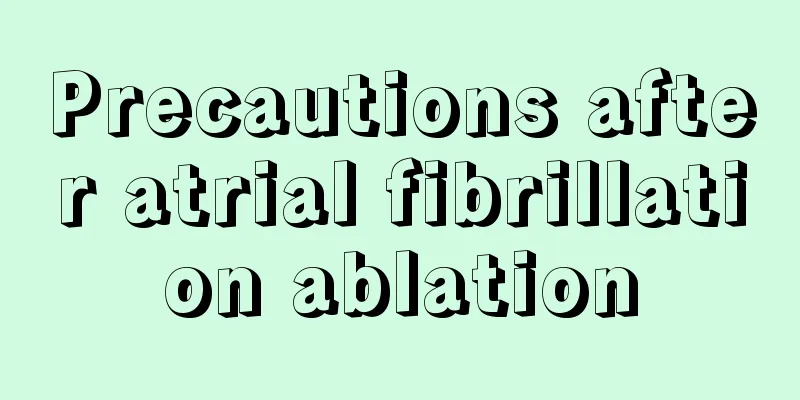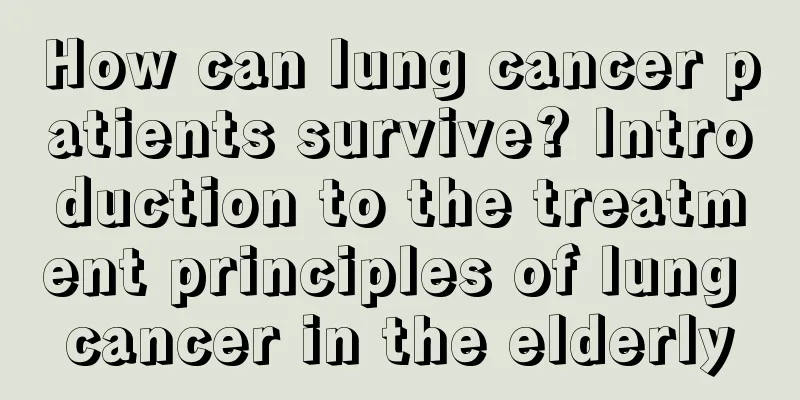Precautions after atrial fibrillation ablation

|
In the past, doctors would recommend surgical treatment for atrial fibrillation, because surgery can cure the disease fundamentally. With the gradual development of medical technology, different treatment methods have emerged for atrial fibrillation. Among them, atrial fibrillation ablation is a minimally invasive surgery for the treatment of atrial fibrillation developed in modern medicine. What should patients pay attention to after atrial fibrillation ablation surgery? What are the precautions during the perioperative period (hospitalization) of radiofrequency ablation for atrial fibrillation? Preoperative Radiofrequency ablation is minimally invasive and should be more accurately called an "operation" rather than a surgery. It does not require incision and only local anesthesia is performed on the puncture wound. During the operation, patients can communicate with the doctor performing the operation at any time, so there is no need to be overly nervous or anxious. It is important to get a good rest before surgery to conserve your energy for preparation. Try not to eat within 6 hours before surgery. The doctor will provide appropriate intravenous fluids for patients who have to wait a little longer. The total time for radiofrequency ablation of atrial fibrillation is about 2-4 hours. Some normal saline will be infused intravenously during the operation. Therefore, for patients who are slightly older or whose operation is expected to take a long time, doctors will recommend preoperative catheterization to avoid holding urine during the operation and difficulty urinating in bed after the operation. If catheterization is inconvenient, you should consciously practice urinating in bed before the operation, and try to empty your urine before the operation. If you feel the urge to defecate during the operation, you should communicate with the surgeon and nurse in time and do not force yourself to do it. Intraoperative Ablation is not completely painless. Radiofrequency is a type of electrical energy, and sensitive patients may feel some pain during the ablation of atrial lesions (near the esophagus and nerve plexus). This feeling is generally tolerable. If the pain is more obvious, the patient can communicate with the surgeon, who will then give the patient an appropriate amount of painkillers. After surgery During the operation, a sheath will be inserted into the femoral vein in the patient's groin (thigh root) as a pathway for the ablation catheter to enter the blood vessel and will be removed after the operation. However, the femoral vein is a relatively thick vein. To prevent bleeding, the doctor will apply pressure to the puncture point after the sheath is removed and stop bleeding. The patient is required to keep the lower limbs immobilized for about 12 hours after the operation. After the immobilization is lifted, the patient can get out of bed and move around, but strenuous activities should still be avoided in the short term, and the wound should be kept away from water within 48 hours. You still need to avoid eating and drinking within 2-3 hours after surgery. After resuming eating, first eat cooler liquid food, soft food, and other foods that are easy to digest and will not damage or increase the burden on the esophagus. |
<<: How to perform atrial fibrillation surgery
>>: What is the reason for gray-black stool
Recommend
What is the difference between heartbeat and heart rate
In daily life, people often mention the word hear...
What is the most correct way to relieve work fatigue?
White-collar workers in cities work a lot every d...
Surgical treatment of colorectal cancer
Colorectal cancer is a common malignant tumor in ...
My butt hurts and there is a lump, what's going on?
Many people don't care much about the pain an...
Why can't I sleep after drinking tea
The reason why you can't fall asleep after dr...
Tinnitus, earache, headache, nasal congestion, is it nasopharyngeal cancer?
Are tinnitus, ear pain, headache, and nasal conge...
Apply honey on face to remove acne
For people who often get acne on their faces, rem...
When should you apply sunscreen?
When you go out, if your skin is directly exposed...
What are the symptoms of canine cystitis
Canine cystitis is a disease called cystitis in d...
How is the treatment for nasopharyngeal carcinoma stage 4a?
Nasopharyngeal carcinoma is a common malignant ca...
Doing 5 small things in the shower will make you healthier
1. Prevent dry lines and cracks After winter and ...
What is the effect of anti-inflammatory mask for pustule acne?
For many female friends, having some pimples on t...
How to treat occasional multi-source ventricular premature beats
Multifocal ventricular premature beats are also c...
Can I have a tooth extracted if I have tooth decay and toothache?
Tooth decay is a very common dental disease, whic...
What to do if your stomach hurts when you eat too fast
Many people eat very fast and it is difficult to ...









